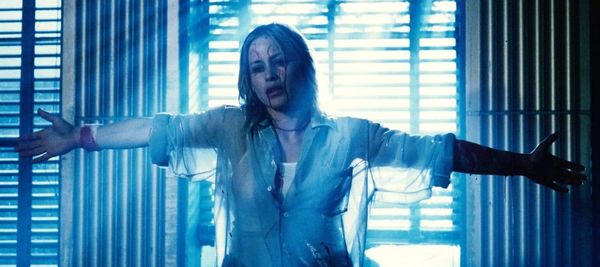Eye For Film >> Movies >> Stigmata (1999) Blu-Ray Review

This long-awaited Blu-ray edition of stigmata is a treat for those who love the film's rich colour palette and detailed imagery, making it easier to appreciate the visual aspects of the film that at any time since it was in cinemas, and thereby considerably enriching an experience that was always heavily dependent on this aspect of storytelling. The package includes a substantial set of extras which, whilst they overlap in places, still include a great deal that will appeal to fans.
Strongest among these is Rupert Wainwright's detailed audio commentary. Wainwright has taken a lot of flak for this film over the years, being dismissed as a music video director who wasn't up to the job, so it's interesting to hear his take on it. There's not a trace of bitterness and he seems as excited about his work now as he did when it was first released. Two major themes are present: the religious symbology he used, which is in some cases quite intricate and obscure; and the special effects design, where he seems to have been much more closely involved that the average director. Given that this was one of the last major films to use exclusively physical special effects, there's historical interest here as well.

Short documentary Divine Rights: The Story Of Stigmata attempts to provide context on stigmata as a real world phenomenon, but really doesn't seem able to decide whether it's a serious documentary or a music video. There's a lot of music in it, along with pretty imagery, sometimes filling as much as two minutes between actual pieces of information. These are not presented with much rigour and the result is something that comes across like a flashy version of the kind of conspiracy theory video one finds on obscure YouTube channels that promise revelation - thematically appropriate, perhaps, but not much use.
The deleted scenes here don't add much to the plot so it's easy to see why they weren't included in the final edit. They're pretty, however, and will be of interest to those keen to see variations on the theme. The alternative ending reveals that Patricia Arquette's character came close to being still more severely disempowered, the film then narrowly escaping the worst kind of romanticisation of female suffering.
You'll also find a music video and trailer here, which deliver pretty much what you'd expect. The text on the main menu is very small and man people will struggle to read it, but otherwise navigation is pretty straightforward.
Reviewed on: 13 Oct 2016

















